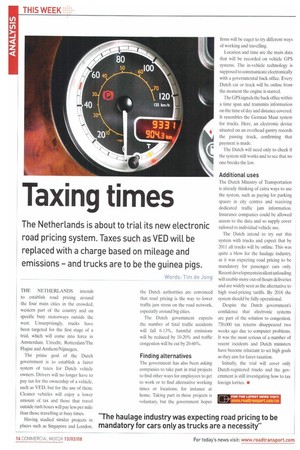Taxing times
Page 16

If you've noticed an error in this article please click here to report it so we can fix it.
The Netherlands is about to trial its new electronic road pricing system. Taxes such as VED will be replaced with a charge based on mileage and emissions and trucks are to be the guinea pigs.
Words: Tim de Jong THE NETHERLANDS intends to establish road pricing around the four main cities in the crowded, western part of the country and on specific busy motorways outside the west. Unsurprisingly, trucks have been targeted for the first stage of a trial, which will come into force in Amsterdam, Utrecht, Rotterdam/The Hague and Arnhem/Nijmegen.
The prime goal of the Dutch government is to establish a fairer system of taxes for Dutch vehicle owners. Drivers will no longer have to pay tax for the ownership of a vehicle, such as VED, but for the use of them. Cleaner vehicles will enjoy a lower amount of tax and those that travel outside rush hours will pay less per mile than those travelling at busy times.
Having studied similar projects in places such as Singapore and London, the Dutch authorities are convinced that road pricing is the way to lower traffic jam stress on the road network. especially around big cities.
The Dutch government expects the number of fatal traffic accidents will fall 6-13%, harmful emissions will be reduced by 10-20% and traffic congestion will be cut by 20-60%.
Finding alternatives The government has also been asking companies to take part in trial projects to find other ways for employees to get to work or to find alternative working times or locations, for instance at home. Taking part in these projects is voluntary, but the government hopes firms will be eager to try different ways of working and travelling.
Location and time are the main data that will be recorded on vehicle GPS systems. The in-vehicle technology is supposed to communicate electronically with a governmental back office. Every Dutch car or truck will be online from the moment the engine is started.
The GPS signals the back office within a time span and transmits information on the time of day and distance covered. It resembles the German Maut system for trucks. Here, an electronic device situated on an overhead gantry records the passing truck, confirming that payment is made.
The Dutch will need only to check if the system still works and to see that no one breaks the law.
Additional uses The Dutch Ministry of Transportation is already thinking of extra ways to use the system, such as paying for parking spaces in city centres and receiving dedicated traffic jam information. Insurance companies could be allowed access to the data and so supply cover tailored to individual vehicle use.
The Dutch intend to try out this system with trucks and expect that by 2011 all trucks will be online. This was quite a blow for the haulage industry, as it was expecting road pricing to be mandatory for passenger cars only. Recent developments in silent unloading will enable more out-of-hours deliveries and are widely seen as the alternative to high road-pricing tariffs. By 2016 the system should be fully operational.
Despite the Dutch government's confidence that electronic systems are part of the solution to congestion. 730,000 tax returns disappeared two weeks ago due to computer problems. It was the most serious of a number of recent incidents and Dutch ministers have become reluctant to set high goals as they aim for fairer taxation.
Initially, the trial will cover only Dutch-registered trucks and the government is still investigating how to tax foreign lorries. • —r www.roultrimitort.concm








































































































































































